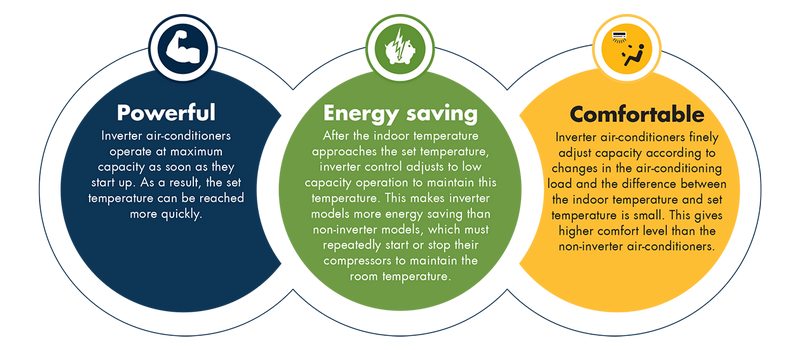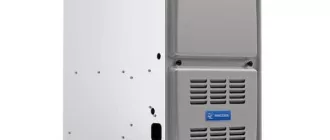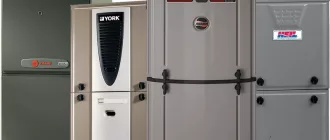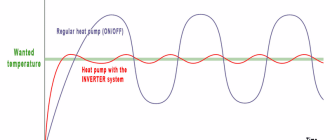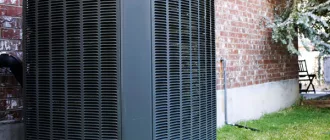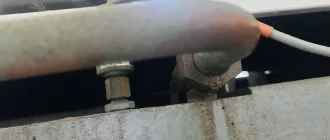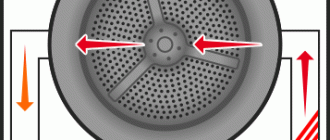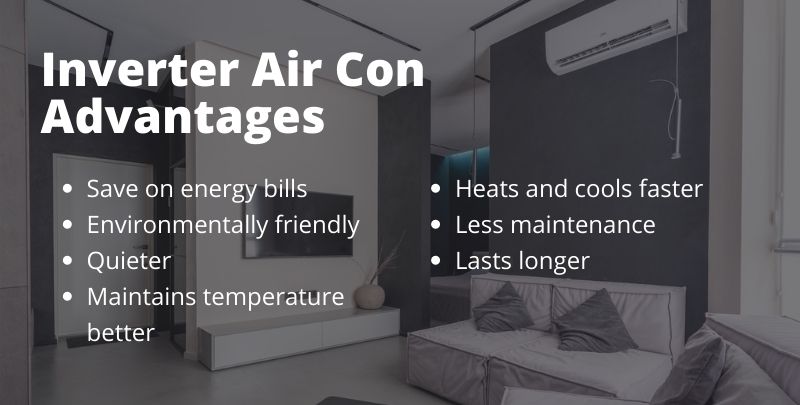
Advancing HVAC Systems: Exploring the Benefits of Inverter Technology
Are you tired of traditional HVAC systems that constantly turn on and off, creating an uncomfortable environment in your home? It’s time to embrace the revolutionizing technology of inverter HVAC systems.
HVAC (Heating, Ventilation, and Air Conditioning) systems equipped with inverter technology provide numerous advantages over conventional models.
Energy Efficiency: Inverter HVAC systems adjust their speed and power output according to the cooling or heating demand. This results in significantly higher energy efficiency compared to traditional systems that operate at a fixed power output.
Constant Comfort: With inverter technology, your HVAC system will maintain a consistent temperature in your home, eliminating the sudden temperature fluctuations caused by the on/off cycling of traditional systems.
Reduced Noise: Inverter HVAC systems operate at lower speeds, resulting in reduced noise levels. Say goodbye to the constant humming and noisy operation of traditional systems.
Don’t miss out on the advantages of inverter technology in HVAC systems. Upgrade your home with an innovative inverter HVAC system and experience the comfort and efficiency it brings.
Advantages of Inverter Technology in HVAC Systems
Revolutionizing the HVAC industry, inverter technology brings a host of advantages to HVAC systems. These cutting-edge advancements in technology have transformed how HVAC systems operate and provide a multitude of benefits for both residential and commercial settings.
- Energy Efficiency: One of the major advantages of inverter technology in HVAC systems is its ability to improve energy efficiency. Traditional HVAC systems use fixed-speed compressors that constantly turn on and off, consuming more energy. In contrast, inverter technology allows the compressor to adjust its speed according to the cooling or heating demand, resulting in more precise temperature control and reduced energy consumption.
- Cost Savings: With increased energy efficiency, inverter technology can significantly reduce energy bills. By optimizing the compressor speed and avoiding unnecessary power surges, HVAC systems with inverter technology can help homeowners and businesses save money in the long run.
- Enhanced Comfort: Inverter technology enables HVAC systems to provide more precise and consistent temperature control. By constantly adjusting the compressor speed, inverter technology avoids temperature fluctuations, ensuring a comfortable environment for occupants.
- Quiet Operation: Traditional HVAC systems with fixed-speed compressors can be noisy when they start up or shut down. Inverter technology eliminates these abrupt changes, resulting in quieter operation. This makes inverter-based HVAC systems ideal for bedrooms, offices, and other areas where noise reduction is important.
- Extended Lifespan: The variable-speed operation provided by inverter technology reduces wear and tear on HVAC components. With less frequent power surges and smoother operation, the lifespan of the HVAC system can be extended, reducing the need for costly repairs or replacements.
With these advantages, it’s clear that inverter technology is revolutionizing the HVAC industry. Its energy efficiency, cost savings, enhanced comfort, quiet operation, and extended lifespan make it an attractive choice for both residential and commercial HVAC systems. Upgrade to inverter technology today and enjoy the benefits it brings to your HVAC system.
Energy Efficiency
One of the key advantages of inverter technology in HVAC systems is its superior energy efficiency. Traditional HVAC systems operate at a fixed speed, which means they are constantly running at full power, even when less cooling or heating is required. This results in wasted energy and higher electricity bills.
With inverter technology, however, the HVAC system can adjust its speed and output based on the actual cooling or heating needs of the space. By running at variable speeds, the inverter technology can match the required load, resulting in significant energy savings.
Additionally, inverter technology allows for precise temperature control, which further enhances energy efficiency. The system can maintain the set temperature more accurately and quickly by adjusting the compressor speed, ensuring a comfortable indoor environment while minimizing energy consumption.
By revolutionizing HVAC systems with inverter technology, we can achieve energy savings of up to 50% compared to traditional systems. This not only reduces the environmental impact but also provides substantial cost savings for homeowners and businesses.
Investing in an inverter-based HVAC system is a smart choice for anyone looking to improve energy efficiency and lower their energy bills. With its superior performance and energy savings, inverter technology is changing the game for HVAC systems.
Cost Savings
One of the major advantages of inverter technology in HVAC systems is the significant cost savings it offers. By revolutionizing the way air conditioning works, inverter technology allows for more efficient and precise control of the cooling process, resulting in reduced energy consumption and lower electricity bills.
Traditional HVAC systems operate using a fixed speed compressor that constantly turns on and off to maintain the desired temperature. This frequent cycling on and off consumes a substantial amount of energy, leading to higher electricity costs. In contrast, inverter technology uses a variable speed compressor that adjusts its power output based on the cooling load. This means that the compressor can operate at a lower speed when the cooling demand is lower, resulting in energy savings.
Additionally, inverter technology allows for better temperature control, eliminating unnecessary and excessive cooling. The ability to adjust the compressor’s speed and capacity allows for precise temperature control, ensuring that the HVAC system only works as hard as it needs to. This not only improves comfort but also helps save energy and reduce costs.
Moreover, the efficiency of inverter technology also extends to the heating function of HVAC systems. Inverter heat pumps, for example, can extract warmth from the outdoor air even in cold temperatures. By utilizing this renewable energy source, inverter heat pumps can provide efficient heating during the winter season, resulting in further cost savings compared to traditional heating methods.
Overall, the cost savings provided by inverter technology in HVAC systems are significant. By reducing energy consumption, improving temperature control, and utilizing renewable energy sources, inverter technology helps homeowners and businesses save money on their heating and cooling expenses.
Precise Temperature Control
One of the key advantages of revolutionizing HVAC with inverter technology is the precise temperature control it offers. Traditional HVAC systems often struggle to maintain a constant temperature throughout a space, resulting in uncomfortable fluctuations. With inverter technology, however, the HVAC system can adjust its speed and power output based on the actual temperature needs of the space, ensuring a consistently comfortable environment.
By continuously monitoring the temperature and making real-time adjustments, inverter technology eliminates the need for frequent on/off cycling that traditional HVAC systems rely on. This not only improves energy efficiency but also helps to prolong the lifespan of the system by reducing wear and tear.
Furthermore, inverter technology allows for more precise control over individual zones or rooms within a building. This means that different areas can be cooled or heated to their specific desired temperatures, providing personalized comfort and eliminating energy waste.
Whether it’s a small residential space or a large commercial building, inverter technology in HVAC systems offers the advantage of precise temperature control, resulting in enhanced comfort, energy savings, and overall improved performance.
Quiet Operation
One of the many advantages of inverter technology is its quiet operation. Traditional HVAC systems can be noisy, especially when the compressor turns on and off. However, with inverter technology, the compressor runs at a consistently low speed, resulting in a much quieter operation.
By using variable speed settings, inverter technology is able to operate at a level that is comfortable for both the occupants of the space and those nearby. This is particularly important in settings such as offices, schools, and hospitals where a quiet environment is essential.
In addition to providing a quiet operation, the use of inverter technology also helps to reduce noise pollution in the surrounding area. By running at a lower speed and reducing energy consumption, inverter technology minimizes the noise generated by the HVAC system, resulting in a more peaceful environment for everyone.
| Advantages of Inverter Technology: |
| 1. Energy Efficiency |
| 2. Cost Savings |
| 3. Enhanced Comfort |
| 4. Quiet Operation (NEW) |
| 5. Reduced Noise Pollution (NEW) |
Extended Lifespan
One of the key advantages of inverter technology in HVAC systems is its ability to significantly extend the lifespan of the equipment. Traditional HVAC systems often have to constantly start and stop, which causes wear and tear on the components and can lead to premature failure.
With inverter technology, the system operates more efficiently and smoothly, without the need for constant starting and stopping. This reduces the strain on the equipment and helps to prevent unnecessary wear and tear.
As a result, HVAC systems with inverter technology can last longer and require fewer repairs and replacements. This not only saves money in the long run but also reduces the environmental impact by reducing waste.
In addition to the extended lifespan, inverter technology also provides other advantages such as energy efficiency, precise temperature control, and quieter operation. It truly revolutionizes the HVAC industry by offering a more advanced and efficient alternative to traditional systems.
Improved Indoor Air Quality
When it comes to revolutionizing HVAC, inverter technology is at the forefront. This innovative technology not only helps to optimize energy efficiency and temperature control, but it also greatly improves indoor air quality.
Traditional HVAC systems often recirculate the same air, leading to a buildup of dust, allergens, and other pollutants. This can have a negative impact on the health and comfort of building occupants. Inverter technology tackles this issue by continuously monitoring and adjusting the speed of the compressor, allowing for precise control of airflow.
By adjusting the speed of the compressor, inverter technology ensures that the air is constantly refreshed, reducing the levels of dust, allergens, and pollutants in the indoor environment. This is especially beneficial for individuals with allergies, asthma, or other respiratory conditions.
Furthermore, inverter technology also helps to maintain a consistent humidity level, preventing the growth of mold and mildew. This is crucial for ensuring a healthy indoor environment, as excess moisture can lead to respiratory issues and damage to the building structure.
In summary, the advantages of inverter technology extend beyond energy efficiency and temperature control. By revolutionizing HVAC systems, this innovative technology greatly improves indoor air quality, creating a more comfortable and healthier environment for building occupants.
Quick Cooling and Heating
One of the key advantages of inverter technology in HVAC systems is its ability to provide quick and efficient cooling and heating.
Traditional HVAC systems often rely on on/off cycling to maintain the desired temperature, which can result in fluctuations and delays in achieving the set temperature. Inverter technology, on the other hand, allows for precise control of the compressor speed, providing a continuous and stable level of cooling or heating.
With inverter technology, the compressor can ramp up or down its speed based on the current needs, ensuring that the set temperature is reached quickly and maintained consistently. This not only provides more comfort to the occupants but also helps to save energy and reduce operating costs.
In addition, inverter technology allows for faster temperature adjustment, providing quick relief during sudden weather changes. Whether it’s a scorching hot day or a chilly winter night, inverter technology can adapt and deliver the desired level of cooling or heating in a matter of minutes.
By revolutionizing HVAC systems with inverter technology, users can enjoy the benefits of quick cooling and heating, enhanced energy efficiency, and a comfortable indoor environment all year round.
| Advantages of Inverter Technology in HVAC: |
| – Quick and efficient cooling and heating |
| – Precise control of compressor speed |
| – Continuous and stable temperature |
| – Energy savings and reduced operating costs |
| – Faster temperature adjustment for quick relief |
Environmentally Friendly
The revolutionary inverter technology in HVAC systems is not only beneficial for energy efficiency and cost savings, but it is also environmentally friendly. By using inverter technology, HVAC systems can significantly reduce their carbon footprint and contribute to a greener environment.
Traditional HVAC systems often operate at a fixed speed, constantly turning on and off to maintain the desired temperature. This results in frequent energy spikes and wasted energy consumption. In contrast, inverter technology allows HVAC systems to vary the compressor speed and airflow based on the real-time cooling or heating demand.
By adjusting the output capacity to match the actual load requirements, inverter technology eliminates energy wastage and achieves optimal energy efficiency. This not only helps to lower energy bills but also reduces greenhouse gas emissions, contributing to a healthier planet.
Furthermore, inverter-based HVAC systems also have the advantage of using eco-friendly refrigerants. These refrigerants have a lower global warming potential (GWP) and ozone depletion potential (ODP), making them less harmful to the environment compared to traditional refrigerants. This ensures that the HVAC systems are not only energy-efficient but also sustainable in the long run.
| Advantages of Inverter Technology: |
| – Energy efficiency |
| – Cost savings |
| – Reduced carbon footprint |
| – Optimal energy consumption |
| – Lower greenhouse gas emissions |
| – Eco-friendly refrigerants |
| – Sustainability |
Consistent Comfort
One of the many advantages of inverter technology in HVAC systems is the ability to provide consistent comfort. Traditional HVAC systems use fixed-speed compressors, which turn on and off to control the temperature in a room. This results in temperature fluctuations, with periods of too hot or too cold.
With inverter technology, the compressor speed adjusts continuously to meet the cooling or heating demand. This means that the temperature remains steady, providing a constant level of comfort. Whether it’s a scorching summer day or a chilly winter night, you can rely on your HVAC system with inverter technology to keep your indoor environment just right.
Not only does inverter technology help maintain a consistent temperature, but it also does so with energy efficiency in mind. By adjusting the compressor speed as needed, the system can avoid unnecessary energy consumption. This results in lower energy bills and a reduced carbon footprint, making inverter technology a sustainable choice for your HVAC needs.
Furthermore, the consistent comfort provided by inverter technology extends beyond temperature control. These advanced systems also offer precise humidity control, air purification, and even air distribution. You can expect a healthier and more comfortable indoor environment, free from stuffiness or excessive dryness.
| Consistent comfort |
| Energy efficiency |
| Precise humidity control |
| Air purification |
| Air distribution |
With all these benefits, it’s no wonder that inverter technology is revolutionizing the HVAC industry. Say goodbye to temperature fluctuations and hello to consistent comfort with inverter technology.
Advanced Technology
Inverter technology is rapidly revolutionizing the HVAC industry, offering numerous advantages over traditional systems. With its innovative design and intelligent control, inverter technology provides exceptional energy efficiency and precise temperature regulation.
One of the key advantages of inverter technology is its ability to vary the speed and power output of the HVAC system, allowing it to continuously match the cooling or heating requirements of a space. This dynamic operation results in significant energy savings compared to conventional systems that operate at fixed speeds and power levels.
Another advantage of inverter technology is its ability to provide precise temperature control. By adjusting the compressor speed and power output, the inverter technology ensures that the desired temperature is achieved and maintained consistently. This eliminates temperature fluctuations and provides a more comfortable environment for occupants.
In addition, inverter technology enhances the overall performance of HVAC systems. With its advanced algorithms and intelligent control, inverter technology enables faster and more accurate temperature adjustments, quicker cooling or heating cycles, and reduced compressor wear and tear. This leads to improved system reliability and longevity, as well as reduced maintenance and repair costs.
Furthermore, inverter technology is beneficial for the environment. By reducing energy consumption and optimizing system operation, it helps to lower greenhouse gas emissions and mitigate the impact of HVAC systems on climate change. This makes inverter technology a sustainable choice for HVAC applications.
In conclusion, the advanced technology of inverter systems is revolutionizing the HVAC industry by offering numerous advantages. From exceptional energy efficiency and precise temperature control to improved performance and environmental benefits, inverter technology is transforming the way HVAC systems operate. Embrace the future of HVAC with inverter technology and experience the difference it can make in your space.
Reduced Carbon Footprint
Revolutionizing HVAC: The Advantages of Inverter Technology brings not only innovative features and improved efficiency but also a significant reduction in carbon emissions.
Traditional HVAC systems are known to contribute to environmental pollution due to their constant on-off cycle and high energy consumption. Inverter technology, on the other hand, provides a more sustainable solution.
By utilizing variable speed motors, inverter HVAC systems can adjust the compressor’s speed based on the actual cooling or heating requirements, resulting in optimized energy usage. This means that the system doesn’t have to continuously run at full capacity, reducing energy waste and carbon emissions.
Moreover, the use of inverter technology allows for more precise temperature control, reducing the need for frequent adjustments and minimizing energy waste even further. This results in a lower overall energy consumption and a smaller carbon footprint.
With the increasing focus on environmental sustainability, opting for HVAC systems that utilize inverter technology is an essential choice for anyone concerned about reducing their ecological impact.
Revolutionize your HVAC system today with inverter technology and make a significant contribution towards a greener, more sustainable future.
Remote Control Capability
With the revolutionary inverter technology, our HVAC systems offer an advanced remote control capability that brings convenience and control to your fingertips. Gone are the days of manually adjusting the temperature or fan speed on your HVAC unit.
Now, you can easily control your HVAC system with just a few taps on your smartphone or tablet. Whether you’re at home, at the office, or on the go, you can easily adjust the settings to create the perfect environment for maximum comfort.
Our remote control capability allows you to:
- Adjust the temperature to your desired level
- Set the fan speed to match your preference
- Schedule automatic temperature adjustments
- Monitor energy usage and efficiency
- Receive alerts and notifications
By leveraging our advanced technology, you have the power to control your HVAC system from anywhere, at any time. Whether you’re coming home from a long day at work or waking up in the morning, you can ensure that your space is always at the ideal temperature.
Revolutionize your HVAC experience with our inverter technology and take advantage of the remote control capability to create the perfect environment for your needs.
Variable Speed Operation
Variable speed operation is one of the key advantages of HVAC technology with inverter technology. Unlike traditional HVAC systems, which operate at a fixed speed, inverter technology allows the compressor to adjust its speed and power output based on the heating or cooling needs of the space.
This variable speed operation offers several benefits. First, it allows for more precise temperature control, ensuring that the space is always at the desired comfort level. The compressor can ramp up or down as needed, providing just the right amount of heating or cooling to maintain the set temperature.
Second, variable speed operation helps to improve energy efficiency. By running at lower speeds when the demand for heating or cooling is lower, the inverter technology consumes less energy compared to traditional systems operating at full power. This results in significant energy savings and lower utility bills.
Additionally, the variable speed operation of inverter technology helps to reduce noise levels. Traditional HVAC systems often make loud noise when they start up or shut down. In contrast, inverter technology operates smoothly and quietly, enhancing the overall comfort and tranquility of the space.
Overall, variable speed operation is a game-changer in HVAC technology. With its advantages of precise temperature control, improved energy efficiency, and reduced noise levels, inverter technology is revolutionizing the way we heat and cool our spaces.
Adaptability to Weather Changes
The inverter technology used in HVAC systems offers numerous advantages, one of which is its adaptability to weather changes. Whether it’s hot summer days or chilly winter nights, the inverter technology allows the HVAC system to efficiently respond to fluctuations in temperature and humidity.
With traditional HVAC systems, the compressor operates at a fixed speed, leading to frequent on/off cycles. This not only consumes more energy but also results in temperature variations and discomfort for the occupants. In contrast, inverter technology adjusts the speed of the compressor according to the current demand, ensuring a consistent and comfortable indoor environment.
The flexible speed control of the inverter technology allows for precise cooling or heating, maintaining the desired temperature without any drastic fluctuations. This results in improved energy efficiency and reduced energy consumption, ultimately leading to cost savings for the users.
In addition, the inverter technology offers superior humidity control, which is crucial in areas with high levels of humidity. By adjusting the compressor speed, the system effectively dehumidifies the air, preventing the growth of mold and providing a healthier indoor environment.
Furthermore, the adaptability of inverter technology to weather changes extends the lifespan of the HVAC system. The gradual start and stop of the compressor reduces wear and tear, resulting in fewer breakdowns and longer maintenance intervals.
In summary, the inverter technology in HVAC systems brings numerous advantages. Its adaptability to weather changes ensures consistent comfort, improved energy efficiency, superior humidity control, and a longer lifespan for the system. With these benefits, it’s clear why inverter technology is revolutionizing the HVAC industry.
Space-saving Design
One of the many advantages of inverter technology in HVAC systems is its space-saving design. Traditional HVAC systems can take up a significant amount of space, especially if you have multiple units installed. In contrast, inverter technology allows for a more compact and streamlined design.
With inverter technology, the compressor motor is able to run at variable speeds, rather than constantly turning on and off. This not only improves energy efficiency and comfort, but also allows for a smaller and more efficient overall system. Inverter technology also eliminates the need for bulky and space-consuming resistance heating elements.
By choosing an HVAC system with inverter technology, you can enjoy the benefits of a more streamlined and space-saving design. This means more room for other equipment or storage space in your home or business. Additionally, the compact design also makes installation easier and more flexible, allowing for greater placement options within your space.
Overall, the space-saving design of inverter technology in HVAC systems is a major advantage that should not be overlooked. Not only does it improve energy efficiency and comfort, but it also provides more versatility and flexibility in terms of installation and usage of your HVAC system.
Increased Property Value
In addition to the numerous advantages that inverter technology brings to HVAC systems, it also has a positive impact on property value. When potential buyers or renters are searching for a new property, an energy-efficient HVAC system is often high on their list of priorities.
With inverter technology, the HVAC system operates more efficiently, resulting in lower energy bills and reduced carbon footprint. This makes the property more appealing to environmentally conscious buyers and tenants.
Furthermore, inverter technology is known for its quiet operation. Traditional HVAC systems can be noisy, which can be a drawback for potential buyers or tenants. By using inverter technology, noise levels are significantly reduced, providing a more comfortable and peaceful living or working environment.
Properties that feature energy-efficient and quiet HVAC systems tend to attract more buyers or tenants and can command higher prices or rental rates. This means that investing in an inverter technology HVAC system is not only beneficial in terms of comfort and cost savings, but it can also increase the overall value of your property.
Revolutionizing the HVAC industry with inverter technology offers a range of advantages, and increased property value is certainly one of them.
Q&A:
What is inverter technology?
Inverter technology is a revolutionary feature in HVAC systems that allows the compressor to modulate its speed, resulting in better energy efficiency, precise temperature control, and quieter operation.
How does inverter technology improve energy efficiency?
Inverter technology works by adjusting the speed of the compressor based on the cooling or heating demand. It avoids the high-energy consumption associated with the traditional on/off cycling of compressors, making it more energy efficient and reducing electricity bills.
What are the advantages of inverter technology in HVAC systems?
Inverter technology offers several advantages. It provides precise temperature control, avoiding temperature fluctuations and maintaining a comfortable indoor environment. It also reduces energy consumption, as the compressor adjusts its speed based on demand. Inverter technology also results in quieter operation, as the compressor does not have to start and stop frequently.
Can inverter technology help save money on electricity bills?
Yes, inverter technology can significantly reduce energy consumption compared to traditional HVAC systems. By adjusting the compressor speed based on demand, it avoids energy wastage and improves efficiency. This can result in substantial savings on electricity bills over time.
Does inverter technology require any special installation?
No, inverter technology does not require any special installation. It can be easily integrated into existing HVAC systems or used in new installations. However, it is important to ensure that the inverter technology is compatible with other components of the HVAC system for optimal performance.
What is inverter technology in HVAC systems?
Inverter technology in HVAC systems is a control feature that allows the compressor to adjust its speed according to the cooling or heating load required. This results in more precise temperature control and increased energy efficiency.
How does inverter technology benefit HVAC systems?
Inverter technology offers several advantages for HVAC systems. It allows for more precise temperature control, leading to increased comfort. It also helps to save energy and reduce electricity bills by adjusting the compressor speed according to the required cooling or heating load. Inverter technology also provides quieter operation and longer lifespan for the compressor.

